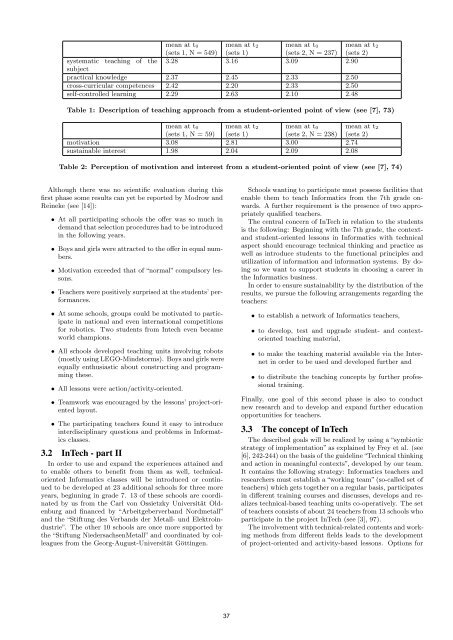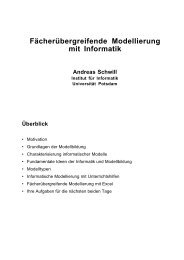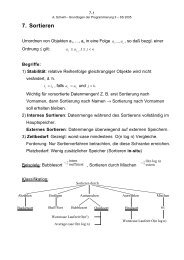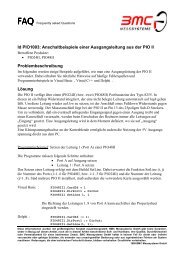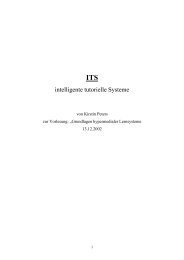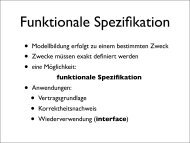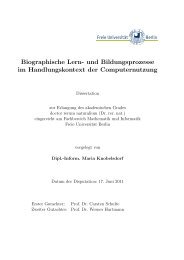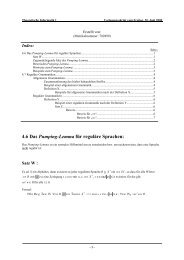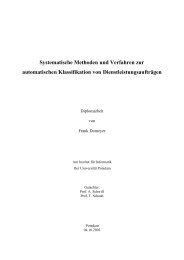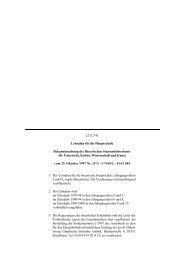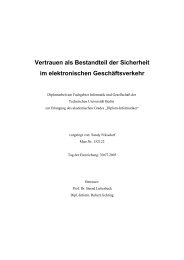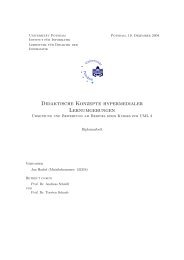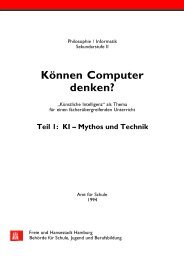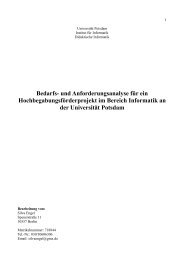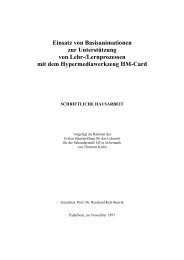Maria Knobelsdorf, University of Dortmund, Germany - Didaktik der ...
Maria Knobelsdorf, University of Dortmund, Germany - Didaktik der ...
Maria Knobelsdorf, University of Dortmund, Germany - Didaktik der ...
Create successful ePaper yourself
Turn your PDF publications into a flip-book with our unique Google optimized e-Paper software.
mean at t0 mean at t2 mean at t0 mean at t2<br />
(sets 1, N = 549) (sets 1)<br />
(sets 2, N = 237) (sets 2)<br />
systematic<br />
subject<br />
teaching <strong>of</strong> the 3.28 3.16 3.09 2.90<br />
practical knowledge 2.37 2.45 2.33 2.50<br />
cross-curricular competences 2.42 2.20 2.33 2.50<br />
self-controlled learning 2.29 2.63 2.10 2.48<br />
Table 1: Description <strong>of</strong> teaching approach from a student-oriented point <strong>of</strong> view (see [7], 73)<br />
mean at t0 mean at t2 mean at t0 mean at t2<br />
(sets 1, N = 59) (sets 1)<br />
(sets 2, N = 238) (sets 2)<br />
motivation 3.08 2.81 3.00 2.74<br />
sustainable interest 1.98 2.04 2.09 2.08<br />
Table 2: Perception <strong>of</strong> motivation and interest from a student-oriented point <strong>of</strong> view (see [7], 74)<br />
Although there was no scientific evaluation during this<br />
first phase some results can yet be reported by Modrow and<br />
Reineke (see [14]):<br />
• At all participating schools the <strong>of</strong>fer was so much in<br />
demand that selection procedures had to be introduced<br />
in the following years.<br />
• Boys and girls were attracted to the <strong>of</strong>fer in equal numbers.<br />
• Motivation exceeded that <strong>of</strong> “normal” compulsory lessons.<br />
• Teachers were positively surprised at the students’ performances.<br />
• At some schools, groups could be motivated to participate<br />
in national and even international competitions<br />
for robotics. Two students from Intech even became<br />
world champions.<br />
• All schools developed teaching units involving robots<br />
(mostly using LEGO-Mindstorms). Boys and girls were<br />
equally enthusiastic about constructing and programming<br />
these.<br />
• All lessons were action/activity-oriented.<br />
• Teamwork was encouraged by the lessons’ project-oriented<br />
layout.<br />
• The participating teachers found it easy to introduce<br />
interdisciplinary questions and problems in Informatics<br />
classes.<br />
3.2 InTech - part II<br />
In or<strong>der</strong> to use and expand the experiences attained and<br />
to enable others to benefit from them as well, technicaloriented<br />
Informatics classes will be introduced or continued<br />
to be developed at 23 additional schools for three more<br />
years, beginning in grade 7. 13 <strong>of</strong> these schools are coordinated<br />
by us from the Carl von Ossietzky Universität Oldenburg<br />
and financed by “Arbeitgeberverband Nordmetall”<br />
and the “Stiftung des Verbands <strong>der</strong> Metall- und Elektroindustrie”.<br />
The other 10 schools are once more supported by<br />
the “Stiftung Nie<strong>der</strong>sachsenMetall” and coordinated by colleagues<br />
from the Georg-August-Universität Göttingen.<br />
37<br />
Schools wanting to participate must possess facilities that<br />
enable them to teach Informatics from the 7th grade onwards.<br />
A further requirement is the presence <strong>of</strong> two appropriately<br />
qualified teachers.<br />
The central concern <strong>of</strong> InTech in relation to the students<br />
is the following: Beginning with the 7th grade, the contextand<br />
student-oriented lessons in Informatics with technical<br />
aspect should encourage technical thinking and practice as<br />
well as introduce students to the functional principles and<br />
utilization <strong>of</strong> information and information systems. By doing<br />
so we want to support students in choosing a career in<br />
the Informatics business.<br />
In or<strong>der</strong> to ensure sustainability by the distribution <strong>of</strong> the<br />
results, we pursue the following arrangements regarding the<br />
teachers:<br />
• to establish a network <strong>of</strong> Informatics teachers,<br />
• to develop, test and upgrade student- and contextoriented<br />
teaching material,<br />
• to make the teaching material available via the Internet<br />
in or<strong>der</strong> to be used and developed further and<br />
• to distribute the teaching concepts by further pr<strong>of</strong>essional<br />
training.<br />
Finally, one goal <strong>of</strong> this second phase is also to conduct<br />
new research and to develop and expand further education<br />
opportunities for teachers.<br />
3.3 The concept <strong>of</strong> InTech<br />
The described goals will be realized by using a “symbiotic<br />
strategy <strong>of</strong> implementation” as explained by Frey et al. (see<br />
[6], 242-244) on the basis <strong>of</strong> the guideline“Technical thinking<br />
and action in meaningful contexts”, developed by our team.<br />
It contains the following strategy: Informatics teachers and<br />
researchers must establish a “working team” (so-called set <strong>of</strong><br />
teachers) which gets together on a regular basis, participates<br />
in different training courses and discusses, develops and realizes<br />
technical-based teaching units co-operatively. The set<br />
<strong>of</strong> teachers consists <strong>of</strong> about 24 teachers from 13 schools who<br />
participate in the project InTech (see [3], 97).<br />
The involvement with technical-related contents and working<br />
methods from different fields leads to the development<br />
<strong>of</strong> project-oriented and activity-based lessons. Options for


